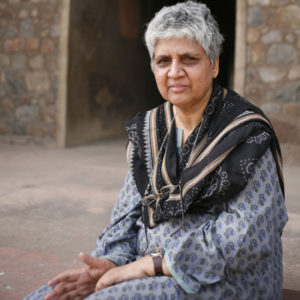Prof. Nalini Madhav Thakur (India)
Professor of Architectural Conservation, School of Planning and Architecture, New Delhi and independent consultant
Which site do you associate your first World Heritage memories with?
Hampi World Heritage site: I have worked on it as volunteer in 1980 doing measured drawings for architect George Michell. In 1982 at ICCROM, I remember I had so many questions about why Hampi was not inscribed. Later when it was in the endangered list prepared the “Integrated Management Plan” for Hampi World Heritage site.
How did your professional journey in the heritage sector begin?
My professional journey began when I came to Delhi to study architecture. I was deeply impressed with Historic Delhi, eternal capital city in the past. After training at ICCROM in 1982, I became a founder member of “Conservation Society Delhi” (CSD), a heritage pressure group. Heritage conservation was still unknown. I immersed myself in CSD activities by taking historic Delhi to her people and talking about Delhi, because I developed a deep understanding of the city during my architecture student days. In 1977, I joined the School of Planning and Architecture in Delhi. Here I made a difference to teaching History of Architecture and introduced “designing in context“. In 1985, I pursued my Masters in Conservation Studies at the University of York, UK. In 1989, I finally joined the Architectural Conservation Department at the School of Planning and Architecture, New Delhi where I have been teaching for 40 years.
In your opinion, what are currently the biggest challenges in the heritage sector?
Our urban planning and development processes do not take in the heritage sector. Our heritage protection and conservation system is absent. Other challenges are the diversity and complexity of South Asia as well as post-colonial conflicts.
Which skills do you think will be important in the future for the heritage sector?
First and foremost, the heritage sector must be considered in urban planning and development processes. Beyond skills professional empowerment from thinking to action will be required. Capabilities in all the disciplines are relevant.
Which advice would you like to give to young heritage professionals?
Preparation starts from developing intellectual ability. Conservation is demanding and needs discipline. Prepare yourselves with knowledge, good ethics, confidence and hard work.

Conservationist Nalini Thakur photographed on the grounds of Khan-i-Khanaan’s tomb, New Delhi on May 13, 2009.
